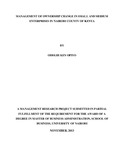| dc.description.abstract | Change is an important factor for the survival and performance of any business organization. It becomes imperative to formulate a strategy that stems the unsavory impact of change within the turbulent business environment. Unlike large business entities, ownership management in SMEs is carried out by the owner who carries out the owner-manager role. This research project attempted to investigate how SMEs within Nairobi County, Kenya apply management of ownership change to adapt to the effects of turbulence in the operating environment. The study further examined the challenges of management of ownership change and the strategies employed by these SMEs to address the challenges they face in the management of ownership change. Various studies have been reviewed on the importance of formulation and implementation of strategies to ensure SMEs transition smoothly from the hands of owner-manager to another manager. Authors talk of change as identified by scale and divided into four different characteristics: fine-tuning, incremental adjustment, modular transformation, and corporate transformation. The study has taken a descriptive research design approach where both open-ended and closed ended questionnaires were used to obtain information from a sample size of 120 respondents. The primary data obtained was then presented, analyzed, and interpreted using descriptive statistics and content analysis methods. The findings of the study revealed that many SMEs endorse organizational culture as an instrument that influences continuity and business development. This culture embodies how management transitions are made, and how sourcing for competent managers is done. The study also found that most SMEs face challenges of mismanagement or even closure after the exit of owner-manager. Ownership management change therefore becomes an important strategy to address such challenges. The study also recommended that proper mechanism to address management change transition as well as strategic planning be entrenched in organizations operations, this will aid communication of future plans and continuity of organizations in the face of Ownership management in SMEs. | en |

